Films from the country "iran", sorted by revenue
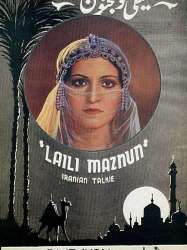
Layla and Majnun (1937)
, 2h25Directed by Abdolhossein Sepanta
Origin Iran
Genres Drama
Actors Abdolhossein Sepanta
L’amour idyllique et fervent d’un jeune bédouin arabe nommé Gheys pour Leyli, la fille d’une famille riche d’un tribut arabe. La folle passion de Gheys lui vaut le surnom de Majnoun, qui veut dire « fou » en arabe. Sepanta en fait une histoire d’amour où l’accent est mis sur la pureté et la véracité d’une grande passion inégalée.
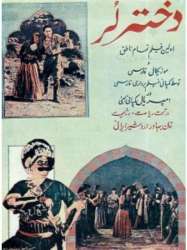
Lor Girl (1933)
, 1h30Directed by Ardeshir Irani
Origin Iran
Genres Drama, Adventure
Actors Roohangiz Saminejad, Abdolhossein Sepanta
The movie is about Golnar, a young teahouse girl who was kidnapped as a child and taken to Lorestan with a clan of bandits living among the Lors. The leader of the thieves, Gholi Khan, is beginning to look at her with interest now she is a grown woman. At the teahouse, she meets a young man called Jafar who has been sent to Lorestan by the Iranian government to deal with the problem of banditry in the area. They fall in love, and plan to escape together. Gholi Khan catches on to their plans and beats up Jafar. Jafar rejects Khan's offer to join the bandits, so he is kidnapped and imprisoned. Golnar helps him escape and the couple attempt to flee.

Portrait de famille (2013)
, 40minutesOrigin Iran
Themes Films about animals, Films about music and musicians, Films about birds, Films about foxes, Musical films, Mise en scène d'un mammifère
Le Mariage du papillon de Mahin Javaherian (2012). Le court métrage contient une chanson. La Noce de Hajar de Mahin Javaherian (2008). Le court métrage contient une chanson.

Goodbye (2011)
, 1h40Directed by Mohammad Rasoulof
Origin Iran
Genres Drama
Actors Fereshteh Sadre Orafaiy, Hasan Pourshirazi, Shahab Hosseini, Behnam Tashakkor, Roya Teymourian
Une avocate iranienne, traquée et privée du droit d'exercer, vit en recluse. Son mari, journaliste et opposant au régime islamiste, se cache dans le sud du pays. Contre une forte somme d'argent, ils tentent de fuir à l'étranger. Une agence de voyages prépare leur départ sous le couvert « légal » d'un accouchement difficile...
 , 1h41
, 1h41Directed by Bahman Ghobadi
Origin Iran
Genres Drama, Musical
Themes Films about music and musicians, Musical films
Actors Hamed Behdad, Shervin Najafian, Bahman Ghobadi
The film follows two young musicians (Ashkan and Negar) as they form a band and prepare to leave Iran shortly after being released from prison. The pair befriends a man named Nader (Hamed Behdad), an underground music enthusiast and producer who helps them travel around Tehran and its surrounding areas in order to meet other underground musicians possibly interested in forming a band and later leaving the country.

Night Bus (2007)
, 1h30Directed by Kiumars Pourahmad
Origin Iran
Genres Drama, Comedy, Crime
Themes Political films
Actors Giovanna Mezzogiorno, Khosrow Shakibai, Valerio Mastandrea, Ennio Fantastichini, Elnaz Shakerdoust, Anna Romantowska
Pendant la guerre Iran-Irak, un jeune combattant iranien a la mission de livrer des prisonniers irakiens à un poste de garnison derrière le front. La tâche s’avère moins évidente qu’on le croyait. Le jeune doit affronter certaines difficultés sur le chemin. Puisque personne ne veut pas l’aider, il se débrouillera tout seul.

Crossroads (2006)
, 1h41Origin Iran
Genres Drama
Actors Fatemah Motamed-Aria, Bahram Radan, Baran Kosari, Soroush Sehhat, Afarin Obeysi
Une gynécologue, le docteur Minoo Rahmani, dont le mari est décédé, aimerait se marier avec Dariush. Sa seule inquiétude est son fils Amir, qui fréquente souvent un jeune un peu délinquant, camarade de l’université, Pedram.

One Night (2005)
, 1h18Directed by Niki Karimi
Origin Iran
Genres Drama
Actors Hanieh Tavassoli
Negar (Hāni'eh Tavassoli) has been kicked out of home by her mother. She is left with no choice but to spend the night walking around the streets of Tehran where she meets three men who all have different stories.

The Lizard (2004)
, 1h55Directed by Kamal Tabrizi
Origin Iran
Genres Comedy, Action
Actors Parviz Parastui, Mehran Rajabi, Rana Azadivar
Reza Mesghaly, known as Reza the Lizard, is a thief known in criminal circles for his ability to bare-handedly climb all walls (from which he derives his name, "the Lizard", or "Marmoulak" in Persian). At the very beginning of the film, he is arrested and charged with armed robbery, a crime that as revealed near the ending of the film, he did not commit. Nonetheless, he is sentenced to life in prison, and is met at the jailhouse by a strict warden, who says that his intention is to "make a person out of prisoners"; thus they will be led into heaven; "by force," if necessary.

Beautiful City (2004)
, 1h41Directed by Asghar Farhadi
Origin Iran
Genres Drama
Actors Taraneh Allidousti, Farhad Ghaemian
Akbar has just turned eighteen. He has been held in a rehabilitation centre for committing murder at the age of sixteen when he was condemned to death. Legally speaking, he had to reach the age of eighteen so that the conviction could be carried out. Now, Akbar is transferred to prison to await the day of his execution. A'la, a friend of Akbar, who himself has undergone imprisonment for burglary, soon after his release tries desperately to gain the consent of Akbar's plaintiff so as to stop the execution.

10 on Ten (2004)
, 1h28Directed by Abbas Kiarostami
Origin Iran
Genres Documentary
Themes Films about films, Documentary films about business, Documentary films about the film industry, Documentary films about films
Actors Abbas Kiarostami
Abbas Kiarostami reprend le dispositif de son film Ten sorti en 2002 : une voiture circulait dans les rues de Téhéran, avec deux caméras fixées sur le tableau de bord, une filmant la conductrice et l'autre filmant le passager. Dans 10 on Ten, une seule caméra filme le conducteur qui se trouve être Kiarostami lui-même. En roulant au travers de la campagne iranienne, il évoque devant le spectateur la réalisation de Ten. Ceci est le point de départ d'une réflexion plus générale sur le processus de création du réalisateur, son rapport au documentaire, au sujet filmé, aux caméras numériques et à l'industrie du cinéma.
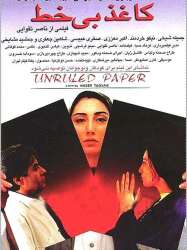
Unruled Paper (2002)
, 1h50Origin Iran
Genres Drama, Comedy
Actors Khosrow Shakibai, Hedieh Tehrani, Jamshid Mashayekhi, Jamileh Sheykhi, Niku Kheradmand, Afarin Obeysi
The film starts with a scene of a sitting room, empty of people, at some two minutes to 7 o'clock in the morning, and ends with a scene of the same empty room at some two minutes past 7 o'clock in the morning of some weeks later; this passage of time is accurately depicted by the brightness of the natural light that is reflected on the wall of a corridor, that leads to this sitting room, in the initial and final scenes. The meticulous attention that Taghvā'i has given to the accurate representation of even the most mundane aspects of the film would at first sight seem to be at odds with the fact that with the exception of the opening and closing scenes, in all other scenes where the clock on the wall of the sitting room is in sight, its pendulum is conspicuously motionless. The opening scene depicts some moments before the family starts a very active day (the day at which the two children of the family, Shangul and Mangul, have their first school-day after the summer school-holiday) and the closing scene, the end of a protracted Friday night, during which Jahāngir and Royā have spent an intellectually and emotionally exhausting night. The motionless pendulum suggests that the events in the intervening period have taken place out of time, or only in imagination. Although the work presented by Taghvā'i certainly qualifies as a surrealist art-form, this motionless pendulum serves as a more profound tool than a means that solely hints at surrealism. Taghvā'i conveys a number of unobtrusive verbal and visual messages to his viewers. Briefly, Taghvā'i and Ms Minoo Farsh'chi, the co-author of the film script, variously refer to the theory of eternal recurrence, as revived by e.g. Friedrich Nietzsche, with a strong emphasis on the importance of having a creative mind thereby to forge room for free will in at least an imaginative world.
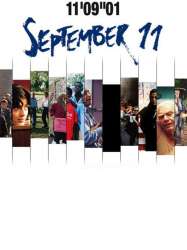
11’09”01—September 11 (2002)
, 2h15Directed by Sean Penn, Claude Lelouch, Amos Gitaï, Youssef Chahine, Alejandro González Iñárritu, Danis Tanović, Ken Loach, Idrissa Ouédraogo, Shōhei Imamura, Mira Nair, Samira Makhmalbaf
Origin Iran
Genres Drama
Themes Films based on the September 11 attacks, Medical-themed films, Films about terrorism, Transport films, Aviation films, Films about disabilities, Dans un avion, Disaster films, Sign-language films, French Sign Language films, Films about language and translation, Films about hijackings
Actors Ernest Borgnine, Emmanuelle Laborit, Akira Emoto, Mitsuko Baishō, Ken Ogata, Keren Mor
Dans un village au Moyen-Orient, la population se prépare à des représailles américaines en préparant des abris de terre cuite. Personne n'appréhende vraiment ce qui s'est passé à New York, mais ils savent que, même s'ils n'ont rien à voir avec cela, ils vont en subir les conséquences. Le film dénonce la manière dont des villages innocents dont la réalité n'a rien à voir avec les attentats du 11 septembre subissent finalement le même sort que les tours, sans vraiment comprendre.

The Longest Night (2001)
Directed by Kiumars Pourahmad
Origin Iran
Genres Drama
Hamed (Mohammad Reza Foroutan), qui aime pourtant sa femme et son enfant, les envoie à l'étranger. Sa femme l'appelle pour lui dire qu'elle est obligée de divorcer de lui et épouser un dénommé Monsieur Sharifi, car elle ne connaît aucun autre moyen d'obtenir un visa de long séjour à l'étranger. Hamed n'est pas d'accord. Mais elle épouse Sharifi sans le consentement de Hamed. Dans un état de dépression, ce dernier s'isole chez lui. Dans une communication téléphonique, Madame Ferdowsi le consolera de son chagrin et ira lui rendre visite.
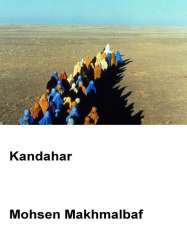
Kandahar (2001)
, 1h25Directed by Mohsen Makhmalbaf
Origin Iran
Genres Drama
Hidden behind a burqa, Nafas, the sister from Canada, makes her way across the border with a family of refugees. When they are robbed by brigands and the family turns back, she decides to continue on her way, accompanied first by a young boy who was just expelled from a Qur'anic school, and then by an African American convert to Islam, who has become disillusioned with the turn the country has taken under the Taliban.
 Connection
Connection